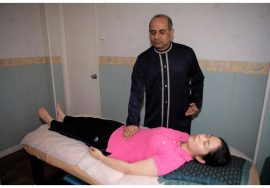
AYURVEDA FOR FERTILITY AND PROCREATION – LIBIDO
Previously we shared some basic information from the vast wisdom of Ayurveda on how individuals with their own specific “Prakruti” (mind-body constitution) interact with their spouses/partners who have either a similar or a different mind-body constitution from them. Here we will discuss and clarify some common misconceptions with regard to one’s sex drive or libido.
In modern times, especially in the western world, people in general have some misunderstandings or misconceptions with regard to one’s sex drive or libido, that “the more, the better”, and often times this same yardstick is used to measure or estimate the virility of men and libido of women. According to Ayurveda, this is called “Fallacy of Generalisation”. In reality, Ayurveda says that since each individual has a different and unique mind-body constitution, they are different with regard to their sexual interest, ability, stamina, etc. Depending on one’s personal mind-body constitution, some will have a strong desire for enjoying sex, while others may feel satisfied and content with much less.
There is nothing wrong with either category of people, they are just different. Many times, this simple lack of knowledge can create serious misunderstandings between couples and sadly can end up in separation and divorce.
Here we will discuss and summarise the information given in our previous blogs, about what Ayurveda says in this regard and what guidelines are mentioned in the most ancient and timeless scripture of Ayurveda, which can be very useful for men and women in modern times as they can benefit greatly by applying these guidelines in their lives, to enhance intimacy and strengthen the bond of love between them, thereby helping to promote a happy and harmonious life.
With regard to sex drive, from the perspective of mind-body constitution, Vata (air) predominant individuals have the least interest in actual sexual activity. If they indulge in sexual activity too often, they may feel physically exhausted, mentally tired and emotionally overly sensitive, due to Vata aggravation in the body.
Pitta (fire) predominant individuals are generally very passionate about romance and physical intimacy. Their sexual appetite is quite good and they enjoy physical intimacy and can handle it very well too.
Individuals with Kapha (water + earth) as the predominant dosha (element) have the biggest sexual appetite, with the greatest biological and emotional need. The only thing is – their sexual drive is not so obvious/apparent like that of Pitta individuals. Also, they do not express their excitement like Vata individuals do. They take quite a bit of time to express their interest and to feel aroused. And once aroused, they can sustain sexual intimacy for a very long time without feeling tired and depleted like Vata individuals; they also don’t feel satisfied so easily like Pitta people. They generally feel quite strong and very happy after making love, and after experiencing it once, feel more inclined to have that experience more often – their stamina is quite good. Some general guidelines to bear in mind before sexual intimacy and for rebuilding the energy used during sexual intimacy:
- One should not indulge in sexual intercourse during the day time, particularly between 10:00 am and sunset.
- Sexual intercourse should be avoided immediately after having a meal, in order to avoid Vata (air) imbalance. It is better to wait for 3 hours (or at least for one hour) after meals before indulging in physical intercourse.
- For Vata (air) individuals, one hour before and 15 minutes after sexual intercourse, they should have preferably one glass of organic fresh cow’s milk (hot) with a little cinnamon powder, cardamom powder and a little rock sugar added to it. Women who want to conceive, should avoid cinnamon powder.
- Pitta individuals should have a glass of room temperature, fresh cow’s milk, one hour before intercourse. The milk should be boiled with cardamom seed powder added to it and then cooled down to room temperature. 1 – 2 tablespoons of pure raw honey should be added to the room temperature milk before drinking it.
- Kapha individuals should drink a glass of cow’s fresh milk (hot), or hot water, 30 minutes after intercourse. They can add 2 – 3 pinches of turmeric powder in the milk/water while boiling.
- To increase the chances of conception, Ayurveda advises one to try for conception from the eighth day from the beginning of the menstruation, up until the 16th day. This period of nine days is considered very potent, as it is when generally women ovulate.
- Ayurveda also recommends that men should lie down on their left for 12 – 15 minutes in order to activate their right nostril for breathing in and out. When the right nostril, which is connected with the sun planet/solar energy, is activated, it makes the sperms very potent and their motility increases. Sperms ejaculated during the time when the right nostril is active in a man’s body, can fertilise the egg quite easily.
There are many more specific guidelines given in Ayurveda with elaborate explanation, which if followed, can increase the chances of conceiving a healthy baby. There are even certain guidelines given which can increase the chances of having a child with a particular gender. In my Ayurveda practice, I have helped quite a few couples using these guidelines from Ayurveda, to have a child of a specific gender.
To book an online appointment at Ayuryoga, with our Ayurveda/Yoga Expert Mr. Vinod Sharma Hong Kong please click here.
DISCLAIMER: This information is intended for educational purposes only & does not constitute expert medical advice, nor is it meant to replace medical recommendations by a medical practitioner. Always consult a qualified Ayurveda Doctor/Health Professional/Yoga Guru for your specific medical needs before taking any herbal health supplements, and/or practicing Ayurveda & Yoga.












